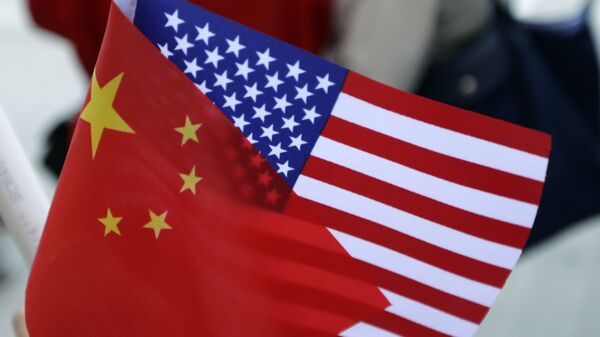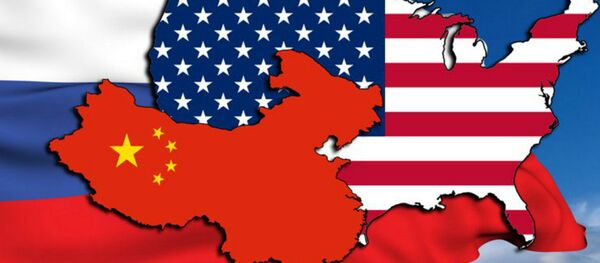The 69-year-old Wang, who helped lead the Chinese president’s sweeping anti-corruption campaign during Xi’s first five years in office, was not included in the country’s new lineup of its core leadership, known as the Politburo Standing Committee (PBSC) of the Communist Party of China, unveiled during the ruling party’s 19th National Congress last October.
READ MORE: Beijing Slams US Plans to Create 5G Network to Counter China's 'Threat'
Wang’s exclusion from the PBSC followed an unwritten rule in the Chinese leadership in recent years, when leaders older than 68 were not expected to hold onto their positions. However, rumors started to circulate late last year that Wang’s political career did not seem to be in jeopardy following his retirement from the PBSC. The powerful ally of Xi is expected to take over the position as the vice president of China during the nation’s annual legislative session of the National People’s Congress in March, the South China Morning Post reported last December.
National Security Issues
Political analysts told Sputnik that Wang’s expertise in handling US-China relations was limited to economic and trade related issues, which are not the primary concerns in bilateral relations between the two nations.
"Before Wang became China’s anti-corruption chief, he represented China in dealings with the United States for many years. But most of those negotiations were focused on economic and trade related issues. If Xi needs his help on those issues, it’s not unexpected. However, there are so many aspects in China-US relations. I think economic and trade issues are becoming less and less important in bilateral relations. The key issues are military and security related issues. Wang never dealt with such issues before. It’s obvious that Xi cannot receive strong assistance from Wang on those issues," Ding Xueliang, a political analyst and a social science professor at the Hong Kong University of Science and Technology, told Sputnik.
The Hong Kong-based scholar pointed out that US President Donald Trump named China as a threat to US national security when he released his first National Security strategy last December.
READ MORE: Nip It in the Bud: US Opens New Front in Trade War With China
"If Trump views as China as a second biggest threat against the United States, behind Russia, he could do a lot of things to hurt Chinese interests. Even if both sides would suffer in such situations, in Trump’s view, damages against China are still way more serious than what the United States may face," Ding said.
"For example, on the Taiwan issue, Trump could offer more advanced weapons to Taiwan, which would put China in a very awkward position, because it’s impossible for Beijing to launch a military attack against Taiwan in response at once. In addition, Trump could also boost Japan’s military strength further, even relaxing US position on nuclear armament of Japan. That would put an enormous amount of pressure on China. There’re a couple of options for China to retaliate. But those options are not enough to match the damages China would experience," Ding said.
Ease Trade Tensions
Following a brief honeymoon period in China-US relations during the early days of Trump’s presidency, when both sides announced a 100-day action plan to address trade disputes between the two nations, the US president grew increasingly hostile against China on trade issues.
READ MORE: Is China Challenging US Leadership?
The Trump administration introduced new anti-dumping import tariffs on Chinese solar panels this month. US regulators also blocked a number of acquisition deals by Chinese investors in the United States, including the fail plan of China’s Ant Finance to acquire US money transfer company MoneyGram and Chinese smartphone maker Huawei’s failed deal with major US wireless carrier AT&T.
Amid growing trade tensions between the two nations, Wang’s expertise and familiarity in dealing with US officials could help ease the tensions, Chinese experts suggested.
"If Wang starts to handle China-US relations, he could help ease the conflicts between the two nations. But it’s impossible for him to resolve those issues fundamentally. That’s because one person’s impact is difficult to overhaul bilateral relations. In addition, the final say on China-US relations still belongs to Chinese president Xi," Deng Yuwen, the former deputy editor of the Central Party School's journal Study Times and currently a senior researcher at the Charhar Institute Beijing, told Sputnik.
The Beijing-based scholar noted that the US officials Wang used to work with are no longer in the Trump administration, which could hinder his impact based on previous personal connections.
Indispensable Ally
If Wang indeed starts to hold a key position in the Chinese leadership once again after the National People’s Congress in March, it would prove that he has become an indispensable ally for the Chinese president, Ding, the Hong Kong-based expert, suggested.
Deng, the Beijing-based scholar, explained that Wang’s comeback proved his value to the Chinese president.
READ MORE: US Navy Vessels Challenge China’s ‘Excessive Maritime Claims’
"If Wang takes a key leadership role again, it shows that there is a special bond between Xi and him. In the past five years, Wang helped Xi crushed a lot of tigers [high-ranking corrupted officials], including many of Xi’s political enemies," he said.
Immune to Outside Influence
Following Wang’s retirement from the PBSC last October, some political analysts speculated that corruption allegations against him from a rogue Chinese businessman may have played a role in him not being able to hold onto power, despite being a key ally of the Chinese president.
The widely expected resurrection of Wang’s political career proves that the Chinese Communist Party would never allow outside influence to dictate its leadership structure and key personnel decisions, Ding, the Hong Kong-based scholar, argued.
"I never thought Guo’s allegations would have an impact on Wang’s political career. If any outside allegations like this would influence the key leadership arrangement of Chinese Communist Party, it would seriously hurt the party’s ability to rule. From the first day of the party’s rule in China, it would never allow outside influence to have an impact on its leadership structure," he said.
READ MORE: Extinguishing the Chinese Sun: Did the US Just Declare Economic War on Asia?
The expert added that Wang’s retirement from the PBSC last October simply proved that Chinese president Xi was not powerful enough to break the unwritten tradition of age limits for communist party leaders.
The views and opinions expressed in the article are those of the analysts and do not necessarily reflect those of Sputnik.







